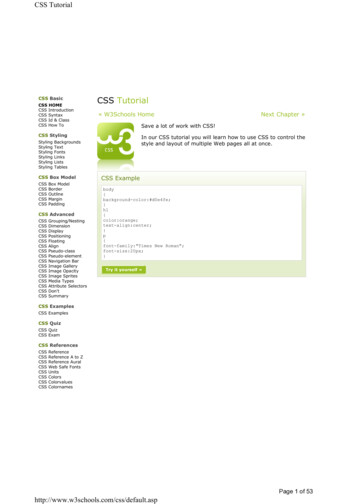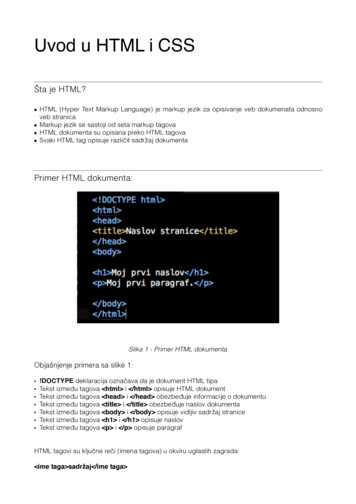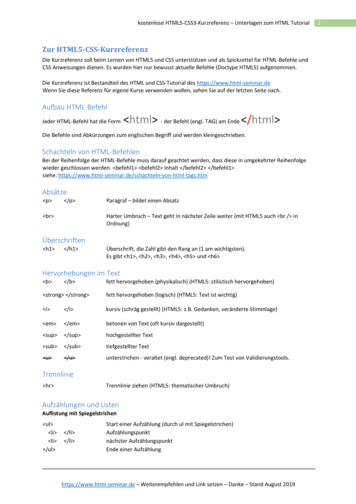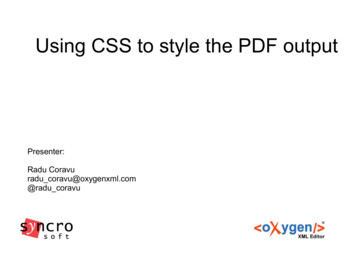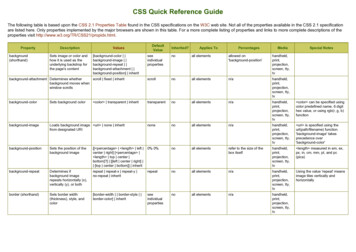
Transcription
EC-CouncilCertified SecuritySpecialistTME CSSEC-CouncilCertifiedSecurity SpecialistEC-CouncilEC-CouncilPROGRAM BROCHUREEC-Council Certified Security Specialist
Course DescriptionEC-Council Certified Security Specialist(ECSS) is an entry level security programcovering the fundamental concepts ofinformation security, computer forensics,and network security. It enables studentsto identify information security threatswhich reflect on the security posture ofthe organization and implement generalsecurity controls.This program will give a holistic overviewof the key components of informationsecurity, computer forensics, and networksecurity. This program provides a solidfundamental knowledge required for acareer in information security.Why is ECSS Important?It facilitates your entry into the worldof Information SecurityIt provides professionalunderstanding about the conceptsof Information Security, NetworkSecurity, and Computer ForensicsIt provides best practices to improveorganizational security postureIt enhances your skills as a SecuritySpecialist and increases youremployabilityEC-CouncilEC-Council Certified Security Specialist
Who Is It For?Target Audience willECSS is designed for anyone who want to enhancetheir skills and make career in information security,network security, and computer forensics fields.Duration: 5 days or 40 hoursCertification:The EC-Council Certified Security Specialist (ECSS)may be taken on the last day of training (optional).Students need to pass the online exam to receiveECSS certification.EC-CouncilEC-Council Certified Security Specialist
Exam DetailsExam TitleEC-Council Certified Security SpecialistExam CodeECSSNumber of Questions50Duration2 hoursExam Availability LocationsEC-Council Exam PortalTest FormatMultiple ChoicePassing Score70%EC-CouncilEC-Council Certified Security Specialist
Legal AgreementEC-Council Certified Security Specialist (ECSS)course mission is to educate, introduce, anddemonstrate fundamentals of information security,network security, and computer forensics. Priorto attending this course, you will be asked to signan agreement stating that you will not use thenewly acquired skills for illegal or malicious attacksand you will not use such tools in an attempt tocompromise any computer system, and toindemnify EC-Council with respect to the use ormisuse of these tools, regardless of intent.The age requirement for attending the training orattempting the exam is restricted to any candidatethat is at least 18 years old. If the candidate is underthe age of 18, they are not eligible to attend theofficial training or eligible to attempt thecertification exam unless they provide theAccredited Training Center (ATC) or EC-Council awritten consent of their parent or their legalguardian and a supporting letter from theirinstitution of higher learning. Only applicants fromnationally accredited institutions of higher learningshall be considered.EC-CouncilEC-Council Certified Security Specialist
Course Outline01Information Security Fundamentals14Web Security02Networking Fundamentals15Ethical Hacking and Pen Testing03Secure Network Protocols16Incident Response04Information Security Threats andAttacks17Computer Forensics Fundamentals05Social Engineering18Digital Evidence06Hacking Cycle19Understanding File Systems07Identification, Authentication, andAuthorization20Windows Forensics08Cryptography21Network Forensics and InvestigatingNetwork Traffic09Firewalls22Steganography10Intrusion Detection System23Analyzing Logs11Data Backup24E-mail Crime and Computer Forensics12Virtual Private Network25Writing Investigative Report13Wireless Network SecurityEC-CouncilEC-Council Certified Security Specialist
What will you Learn?Students going through ECSS training will learn:01Key issues plaguing the information security, network security, and computer forensics02Fundamentals of networks and various components of the OSI and TCP/IP model03Various network security protocols04Various types of information security threats and attacks, and their countermeasures05Social engineering techniques, identify theft, and social engineering countermeasures06Different stages of hacking cycle07Identification, authentication, and authorization concepts08Different types of cryptography ciphers, Public Key Infrastructure (PKI), cryptographyattacks, and cryptanalysis tools09Fundamentals of firewall, techniques for bypassing firewall, and firewall technologiessuch as Bastion Host, DMZ, Proxy Servers, Network Address Translation, Virtual PrivateNetwork, and Honeypot10Fundamentals of IDS and IDS evasion techniques11Data backup techniques and VPN securityEC-CouncilEC-Council Certified Security Specialist
What will you Learn?Students going through ECSS training will learn:12Wireless Encryption, wireless threats, wireless hacking tools, and Wi-Fi security13Different types of web server and web application attacks, and countermeasures14Fundamentals of ethical hacking and pen testing15Incident handling and response process16Cyber-crime and computer forensics investigation methodology17Different types of digital evidence and digital evidence examination process18Different type of file systems and their comparison (based on limit and features)19Gathering volatile and non-volatile information from Windows and networkforensics analysis mechanism20Steganography and its techniques21Different types of log capturing, time synchronization, and log capturing tools22E-mails tracking and e-mail crimes investigation23Writing investigation reportEC-CouncilEC-Council Certified Security Specialist
EC-Councilw w w. e c c o u n c i l . o r g
information security, computer forensics, and network security. It enables students to identify information security threats which reflect on the security posture of the organization and implement general security controls. This program will give a holistic overview of the key components of information security, computer forensics, and network
